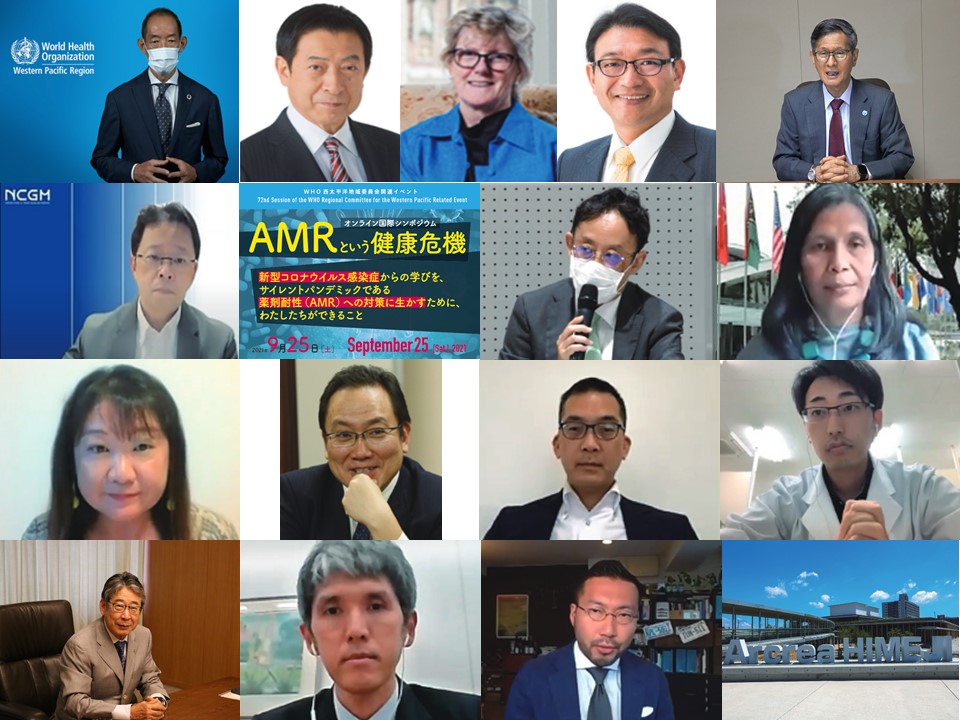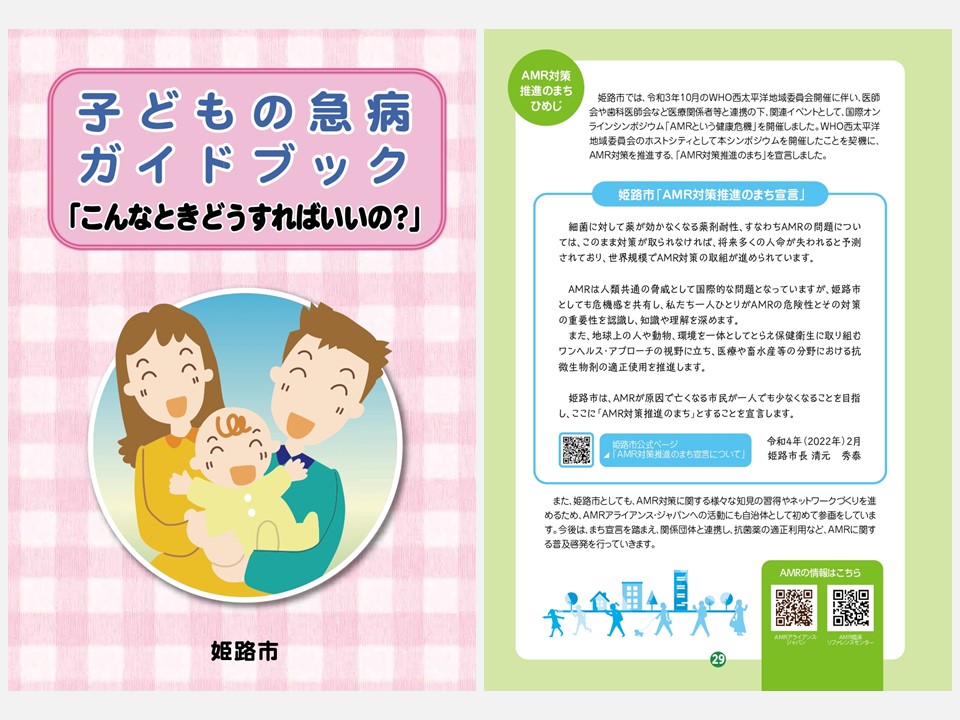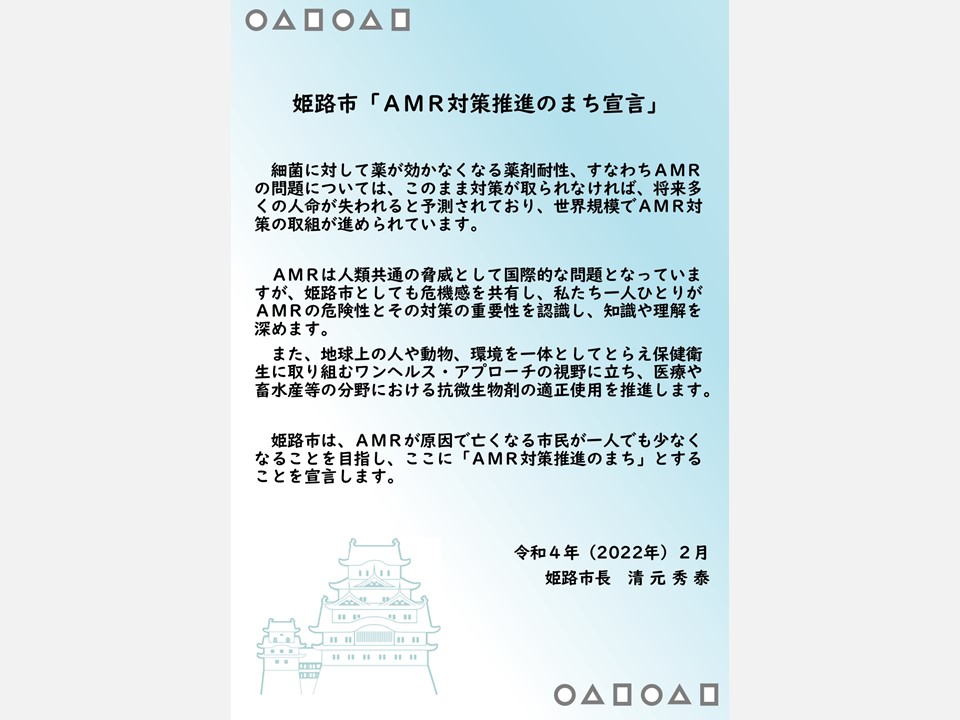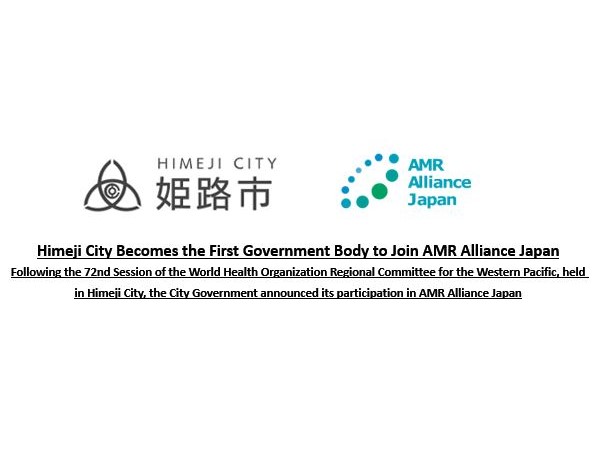[Event Report] The 25th Annual Conference of the Japan Society of Disaster Nursing, Workshop I – Considering Disasters and Antimicrobial Resistance (AMR) (September 3, 2023)
date : 12/6/2023
Tags: AMR
![[Event Report] The 25th Annual Conference of the Japan Society of Disaster Nursing, Workshop I – Considering Disasters and Antimicrobial Resistance (AMR) (September 3, 2023)](https://hgpi.org/en/wp-content/uploads/sites/2/AMRalliance-logo-11-32.jpg)
On Sunday, September 3, 2023, Health and Global Policy Institute (HGPI) led Workshop I – “Considering Disasters and Antimicrobial Resistance (AMR)” at the 25th Annual Conference of the Japan Society of Disaster Nursing in Himeji City, Hyogo Prefecture.
It is said that healthcare during times of emergency is in a state of imbalance among those who require care on the demand side and healthcare providers or necessary goods on the supply side. In the field of AMR, there tends to be continuous supply-side instability even during periods of non-emergency due to supply shortages and lagging R&D for new antimicrobials. Given these circumstances, if multiple major disasters caused by earthquakes or typhoons were to occur during the same period or at the same time, it could exacerbate AMR-related problems or shortages in the antimicrobial supply. This could trigger a major imbalance in supply and demand and result in another disaster in the form of an AMR outbreak.
Furthermore, the COVID-19 pandemic demonstrated that concepts from crisis management are indispensable in infectious disease control. AMR has also been called a “silent pandemic” because it is difficult to grasp circumstances during the expansion of an AMR outbreak.
Based on our recognition of this issue, Workshop I was held to examine AMR control from the perspectives of disaster measures and crisis management. Together with our fellow participants, who serve in the field of disaster nursing and possess a vast amount of experience in crisis response for COVID-19 and major disasters, we identified current issues and examined future countermeasures for AMR, an area in which outbreaks can occur and expand unnoticed.
This conference was held in Himeji City, which joined AMR Alliance Japan (Secretariat: HGPI) as an administrative district in 2021. In addition to presenting its “Municipal Declaration on the Promotion of AMR Countermeasures” in 2022, Himeji City is making various efforts for AMR control.
Key points of the discussion
- AMR control can be viewed in terms of self-help, mutual aid, and public assistance, which are core concepts in disaster response.
- “Self-help” in AMR control includes items like acquiring correct knowledge regarding antimicrobials and participating in training and exercises on using the right antimicrobials at the right times.
- “Mutual aid” in AMR control includes building networks among healthcare institutions in communities and implementing standardized, sustainable AMR control measures at healthcare institutions.
- “Public assistance” in AMR control includes reinforcing initiatives according to national strategies, sharing basic information on AMR (such as the relationship between the common cold and antimicrobials) through educational support and awareness-building activities, and sharing information and conducting drills with an awareness toward emergencies during periods of non-emergency.
- Nurses can participate in AMR control in various settings. It will also be important to promote infection control measures centered around standard prevention strategies to serve as the basis for AMR control.
- Nurses are members of Antimicrobial Stewardship Teams (ASTs). In this role, it is important for nurses to actively consider the background of physicians’ instructions at all times. This includes considering when and how to use antimicrobials for which infections, or why their use is necessary. The updated National Action Plan on AMR presented in April 2023 also recommends promoting antimicrobial stewardship efforts from nurses.
- Nurses can make multifaceted contributions to AMR control in addition to promoting AST activities and antimicrobial stewardship or by administering antimicrobials. For example, having nurses conduct specimen collection or observe and record patients’ conditions can be linked to the creation of forward-looking infection control measures that anticipate emergencies.
- It is also important to implement standard infection control measures in addition to AMR control and activities targeting AMR bacteria. In particular, preventing nosocomial infections is a general infection countermeasure as well as a basis for AMR control. Implementing infection control measures centered on standard prevention strategies during periods of non-emergency will make it possible to carry out effective infection control measures during disasters and other emergencies.
[Event overview]
- Date & time: Sunday, September 3, 2023; from 11:00 to 12:00 JST
- Venue: Arcrea Himeji (the Himeji City Culture Hall and Conference Center)
- Format: Roundtable discussion held at venue (In-person only)
- Language: Japanese
[Program] (Titles omitted)
| 11:00-11:05 | Explanatory introduction 1: Introduction |
| Yui Kohno (Manager, HPGI) | |
| 11:05-11:10 | Explanatory Introduction 2: Disasters and AMR |
| Kai Shigeno (Senior Associate, HGPI) | |
| 11:10-11:25 | Guest lecture 1: AMR-Related Issues in Emergency Medical Settings |
| Masashi Kasai (Director, Department of Infectious Diseases, Hyogo Prefectural Kobe Children’s Hospital) | |
| 11:25-11:40 | Guest lecture 2: The Role of Nurses in AMR Control |
| Yoshiko Nabetani (Deputy Director of Nursing, Department of Infection Control and Division of Nursing, Osaka University Hospital; Certified Nurse for Infection Control (CNIC)) | |
| 11:40-12:00 | Discussion – Considering Disasters and AMR |
| Four speakers and audience participants |

■ Speaker profiles
Masashi Kasai (Director, Department of Infectious Diseases, Hyogo Prefectural Kobe Children’s Hospital)
Dr. Masashi Kasai graduated from Toyama Medical and Pharmaceutical University in 1998. After training in the pediatric department of a city hospital and providing intensive care, general medicine, and infectious disease treatment at a pediatric hospital, he came to recognize the importance of preserving antimicrobials for future generations of children. Since assuming his current role at the Hyogo Prefectural Kobe Children’s Hospital Department of Infectious Diseases in January 2016, he has worked with fellow pediatric infectious disease specialists throughout Japan in efforts focusing on unrefined AMR control measures in community pediatric care settings.
Yoshiko Nabetani (Deputy Director of Nursing, Department of Infection Control and Division of Nursing, Osaka University Hospital; Certified Nurse for Infection Control (CNIC))
After joining Osaka University Hospital, Ms. Yoshiko Nabetani served in the Gastroenterological Surgery unit of the Department of Surgery and the Hematology and Oncology unit in the Department of Medicine before transferring to the Department of Infection Control in April 2003. She became a Certified Nurse for Infection Control (CNIC) in 2004 and was appointed the Deputy Director of the department in April 2007. She completed a Master’s degree in Infection Control and Nursing at International University of Health and Welfare Graduate School of Nursing in March 2012. She has served as Deputy Director of Nursing of the Department of Nursing since April 2017. She serves as a Board Member of the Japanese Society for Infection Prevention and Control and belongs to the Infection Control Network of Japan, the Japanese Society of Infectious Diseases, the Japan Academy of Nursing Science, and the Japan Academy of Nursing Administration and Policies.
Top Research & Recommendations Posts
- [Policy Recommendations] The Path to a Sustainable Healthcare System: Three Key Objectives for Public Deliberation (January 22, 2026)
- [Research Report] Perceptions, Knowledge, Actions and Perspectives of Healthcare Organizations in Japan in Relation to Climate Change and Health: A Cross-Sectional Study (November 13, 2025)
- [Research Report] The 2025 Public Opinion Survey on Healthcare in Japan (March 17, 2025)
- [Policy Recommendations] Reshaping Japan’s Immunization Policy for Life Course Coverage and Vaccine Equity: Challenges and Prospects for an Era of Prevention and Health Promotion (April 25, 2025)
- [Research Report] The 2023 Public Opinion Survey on Satisfaction in Healthcare in Japan and Healthcare Applications of Generative AI (January 11, 2024)
- [Research Report] AMR Policy Update #4: Cancer Care and AMR (Part 1)
- [Policy Recommendations] Developing a National Health and Climate Strategy for Japan (June 26, 2024)
- [Public Comment Submission] “Assessment Report on Climate Change Impacts in Japan (Draft Overview)” (December 24, 2025)
- [Research Report] Survey of Japanese Physicians Regarding Climate Change and Health (December 3, 2023)
- [Research Report] The Public Opinion Survey on Child-Rearing in Modern Japan (Final Report) (March 4, 2022)
Featured Posts
-
2026-01-09
[Registration Open] (Hybrid Format) Dementia Project FY2025 Initiative Concluding Symposium “The Future of Dementia Policy Surrounding Families and Others Who Care for People with Dementia” (March 9, 2026)
![[Registration Open] (Hybrid Format) Dementia Project FY2025 Initiative Concluding Symposium “The Future of Dementia Policy Surrounding Families and Others Who Care for People with Dementia” (March 9, 2026)](https://hgpi.org/en/wp-content/uploads/sites/2/dementia-20260309-top.png)
-
2026-02-05
[Registration Open] (Webinar) The 141st HGPI Seminar “Current Status and Future Prospects of Korea’s Obesity Policy: Voices of People with Lived Experience in Policy Promotion” (March 3, 2026)
![[Registration Open] (Webinar) The 141st HGPI Seminar “Current Status and Future Prospects of Korea’s Obesity Policy: Voices of People with Lived Experience in Policy Promotion” (March 3, 2026)](https://hgpi.org/en/wp-content/uploads/sites/2/hs141-top-1.png)
-
2026-02-06
[Research Report] AMR Policy Update #5: Cancer Care and AMR (Part 2)
![[Research Report] AMR Policy Update #5: Cancer Care and AMR (Part 2)](https://hgpi.org/en/wp-content/uploads/sites/2/HGPI_20260204_AMR-Policy-Update-5.png)








